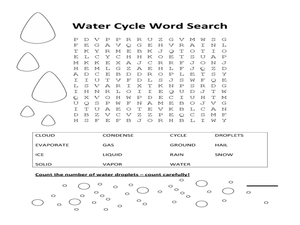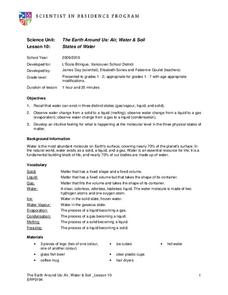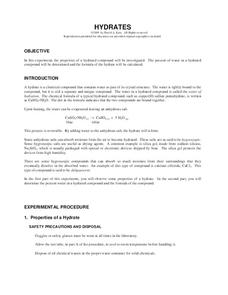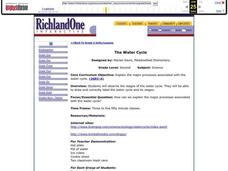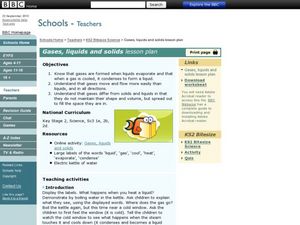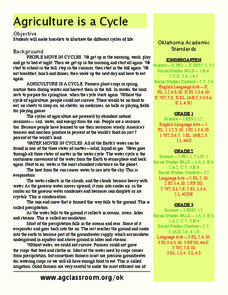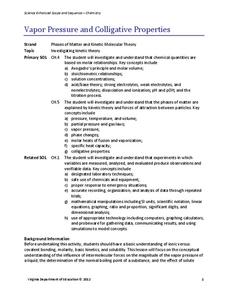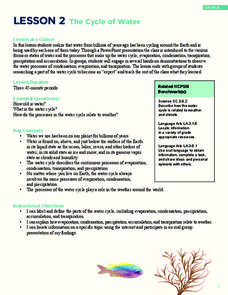Curated OER
The Water Cycle and Sources of Pollution
Learners make an island that has a construction site on it. They spill siulated pollution and trash on top of the island and then water it to simulate rain. They will observe how the rain washes dirt, sand, and pollution off the island...
Curated OER
The Great Melting Race
Students show their knowledge by choosing the correct answer about solids, liquids and gases. Students also write short answer responses to questions about experiments they have done.
Curated OER
States of Water
Students investigate the 3 states of matter. For this physical science "matter" lesson, students observe and participate in a number of demonstrations involving melting and freezing water. Students observe the effect heat has on changing...
Curated OER
The Water Cycle
Young scholars simulate the water cycle. In this water cycle instructional activity, students create a model of the water cycle. Young scholars draw the water cycle and write a paragraph explaining their drawing.
Curated OER
The Wonderful world of Water
First graders examine the water cycle through readings and experiments. In groups, they conduct interviews with others and use the information to create a chart displaying the various uses of water. After brainstorming lists of ways to...
Curated OER
Water, Water, Everywhere!
Students complete a WebQuest. In this water cycle lesson, students investigate the cycle through a WebQuest activity. Students research the water cycle through Internet resources and create a documentary video of their process.
National Wildlife Federation
Get Your Techno On
Desert regions are hotter for multiple reasons; the lack of vegetation causes the sun's heat to go straight into the surface and the lack of moisture means none of the heat is being transferred into evaporation. This concept, and other...
Curated OER
Drip... Drop... Raindrops
Learners demonstrate the steps of evaporation, cloud formation, and precipitation within the water cycle. They make and demonstrate how to use a hygrometer to record daily humidity and describe how rain, snow, and sleet form.
Outside Education
Water Cycle Adventure
Evaporation, transpiration, condensation, precipitation, accumulation. Steam, clouds, rain, lakes. Guide your class members on an imaginary journey through the water cycle with a water cycle adventure script.
Chymist
Hydrates
What occurs when a hydrate is heated? Lead your class in exploring the answer to this question as they investigate the properties of a hydrated compound. They heat copper(II) sulfate pentahydrate and evaporate the water byproduct to...
Curated OER
Capillary Action and Adhesion
Learners perform classroom experiments to observe adhesion. They perform a second experiment using sand, salt, water, and a heat lamp to observe the principle of capillary action. They also experiment with adhesion in plants.
Curated OER
The Water Cycle
Second graders conduct an a water cycle experiment. In this water cycle instructional activity, 2nd graders observe a puddle of water, they predict how it got there and what will happen to it. Students watch a demonstration on the water...
Curated OER
The Cool Forms of Water
Students discover the different forms of water on Earth. For this states of water lesson, students read material on the different forms of water and how they are created. The students answer written questions on worksheets.
Curated OER
Gases, Liquids and Solids, evaporate, shape volume,
Students conduct an online experiment to discover what happens to solids, liquids and gases in different temperatures. For this states of matter lesson, students get into pairs and work in a virtual laboratory to manipulate heating and...
Curated OER
The Water Cycle in a Bowl
Students conduct an experiment on the stages of the Water Cycle. In this water cycle lesson, students view the materials needed for the experiment and brainstorm how they relate to the Water Cycle. Students conduct an experiment where...
Curated OER
Agriculture is a Cycle
Students explore cycles in nature. In this cross curriculum agriculture lesson, students define "cycle" and research weather and planting folklore. Students make a bracelet in which individual colored beads represent the many "cycles" of...
Virginia Department of Education
Vapor Pressure and Colligative Properties
Hate to vacuum, but enjoy using a vacuum pump? Explore a lesson plan that starts with a demonstration of boiling water at various temperatures by using a vacuum pump. Then scholars design their own experiments to measure vapor pressure...
Virginia Department of Education
Heat and Thermal Energy Transfer
How does radiation affect our daily lives? Answer that question and others with a lesson that discusses radiation and its use in thermal energy transfer through electromagnetic waves. Pupils investigate vaporization and evaporation while...
Virginia Department of Education
A Crystal Lab
Young chemists grow ionic crystals, metallic crystals, and supersaturated crystals in three different lab experiments. Observing these under a microscope allows pupils to compare the various structures.
Oceanic Research Group
Heat Transfer and Cooling
Astronauts train underwater to simulate the change in gravity. An out-of-this-world unit includes three hands-on activities, one teacher demonstration, and a discussion related to some of the challenges astronauts face. Scholars apply...
NOAA
The Cycle of Water
Young water cycle enthusiasts discover the water they have been using has been cycling around the earth for billions of years. Through presentations, learners will understand that water has three states and how these forms fit into the...
Pennsylvania State University
Learn, Protect, and Promote Water
A hands-on activity helps learners explore the water cycle. After discussing how they use water, classes discuss water pollution and then move into a simulation where 20 pupils move through the water cycle based on description cards.
American Chemical Society
Norbert Rillieux, Thermodynamics and Chemical Engineering
The man who invented the earliest examples of chemical engineering was an American-born, French-educated, free man of color before the Civil War, and went on to translate Egyptian hieroglyphics. There is something of interest for almost...
Science 4 Inquiry
States and Phases of Matter
Plasma is the most common phase of matter in our universe. Scholars explore the change of energy as molecules change phases of matter. They rotate through stations, graphing the changes in energy level.
Other popular searches
- Water Cycle and Evaporation
- Evaporation Experiment
- Evaporation and Condensation
- Condensation Evaporation
- Evaporation Kindergarten
- Heat and Evaporation
- Water Evaporation
- Melting and Evaporation
- Science Evaporation
- Filtration and Evaporation
- Condensation Evaporation Dew
- Evaporation and Temperature



